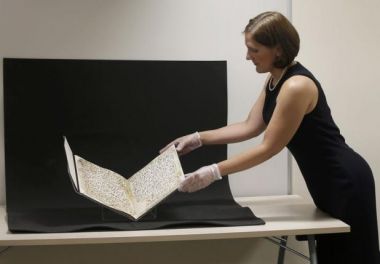Ancient manuscripts suggest Muhammad did not write Quran, experts say

Followers of the Islamic religion believe that their holy book, the Quran, was revealed by Allah to their most revered prophet, Muhammad.
Ancient manuscripts obtained by the University of Birmingham, however, suggest that it was not exactly Muhammad who wrote the Quran.
Jamal bin Huwareib, managing director of the Mohammed bin Rashid Al Maktoum Foundation, said based on the two leaves of an ancient Quran in the British university, Islam's holy book appeared to have been written by Abu Bakr, who was the Muslim prophet's close companion.
"It's the most important discovery ever for the Muslim world. I believe this is the Quran of Abu Bakr," bin Huwareib told BBC after examining the ancient manuscripts.
The scholar also suggested that Muhammad may have commissioned Abu Bakr, a caliph who ruled from 632 to 634, to write the Quran based on the high quality of the handwriting and the parchment used in the ancient manuscript, indicating that it was made for someone important.
"This version, this collection, this manuscript is the root of Islam. It's the root of the Quran. This will be a revolution in studying Islam," bin Huwareib said.
Radioactive testing done on the Birmingham transcript also dated the ancient manuscript between 568 and 645, or possibly 13 years after the death of Muhammad in 632.
David Thomas, Birmingham University's professor of Christianity and Islam, explained that this indicated that the manuscript already existed during the early days of Islam.
"The person who actually wrote it could well have known the Prophet Muhammad," Thomas also told BBC.
With these facts, Professor Joseph Lumbard from the department of Arabic and translation studies at the American University of Sharjah in the United Arab Emirates, said the possibility that Muhammad did not write the Quran himself cannot be ruled out.
"I would not discount that it could be a fragment from the codex collected by Zayd ibn Thabit under Abu Bakr," Lumbard said.











